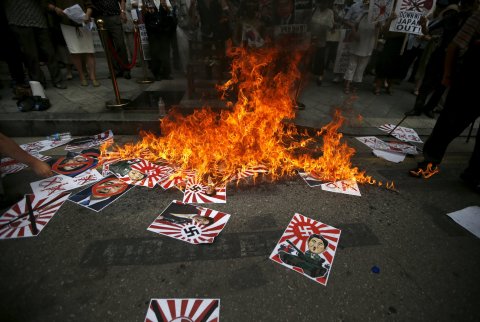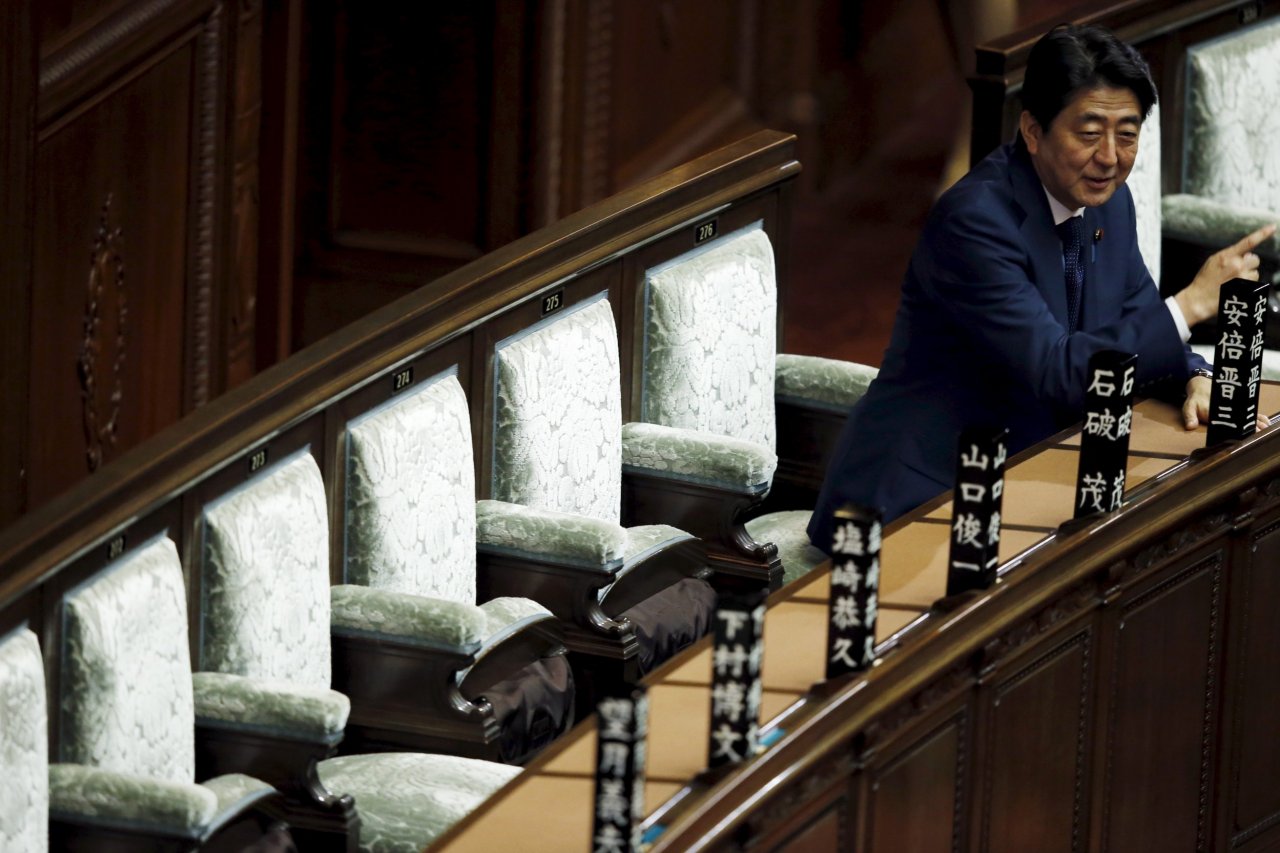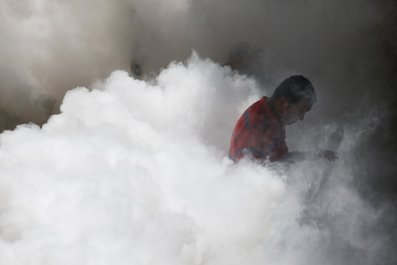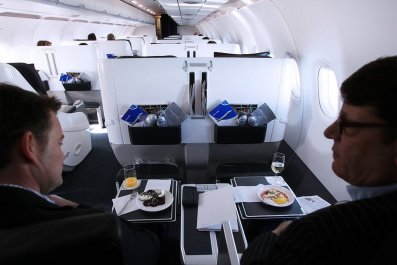Updated | It's easy to think of Japan as the country that has fallen and can't get up. The country that's in a perpetual economic funk—more than two decades and counting; a country that can't escape deflation no matter how hard it tries. In an era when Western business executives and traders obsess over China, and governments focus on ISIS, Syria, Iran and Vladimir Putin, Japan has receded into international obscurity.
But while much of the world was looking away, Shinzo Abe, the country's prime minister since 2012, has become one of the most consequential Japanese politicians of the postwar era. That became undeniable in the wee hours of September 19, a Saturday morning, when the Japanese parliament (the Diet) passed a series of historic—indeed, once unthinkable—bills, despite massive protests on the streets of Tokyo. From now on, Japan's military, known as its Self-Defense Forces, will be permitted to fight overseas, under the guise of self-defense or coming to an ally's aid—even if Japan is not directly threatened.
It was the most significant shift in Tokyo's defense policy since World War II. The constitution adopted in 1947 during the occupation presided over by U.S. General Douglas MacArthur renounced war, and in its famous Article 9 Japan "formally committed itself to a pacifist course," as American historian John Dower put it in his Pulitzer Prize–winning book, Embracing Defeat: Japan in the Wake of World War II. "The radicalism of these policies," he wrote, "shocked the elites who held power when the war ended.''
One of those elites was Nobusuke Kishi, who helped run the Japanese occupation of Manchuria before wartime Prime Minister Hideki Tojo named him to his cabinet as minister of munitions. After Japan's surrender, the U.S. arrested Kishi and held him as an alleged war criminal for three years, but never brought him to trial. Less than a decade later—with the U.S. having turned its attention to waging the Cold War against the Soviet Union—Kishi, a member of the conservative Liberal Democratic Party, became Japan's prime minister.
Kishi loathed Article 9, but he was stuck with it. So he tried to amend another central plank of Tokyo's postwar order: the U.S.-Japan Security Treaty. He believed it made Japan a vassal of Washington and worked furiously to revise it. In 1960, he persuaded President Dwight D. Eisenhower to amend the treaty and presented this new version to the Diet for ratification. That triggered huge demonstrations in Tokyo, including one in which a university student was killed in clashes with police in front of the Diet building. The treaty was amended, but Kishi was forced to resign.
Nobusuke Kishi was Shinzo Abe's grandfather. And it is an article of faith among the political left in Japan, which views Abe as a neo-nationalist at minimum and a full-throated militarist at worst, that in his pursuit of the historic security bills passed on September 19, he is moving Japan closer to the vision that animated his grandfather: that of a country with a once-again powerful military, able and willing to project force on its own—and no longer Washington's security lapdog. And there was, indeed, a "déjà vu all over again" quality to the furious debate over the legislation. In the run-up to the passage of the bills, Tokyo was again the scene of massive protests that conjured images of the so-called Days of Rage demonstrations against Kishi in 1960.
The people around Abe reject the notion that he is following his grandfather's example. Tokyo's security environment is now defined, they say, by a rising and hostile China rapidly increasing its own defense spending and openly making territorial claims to islands that are indisputably part of Japan. "This has nothing to do with the prime minister's grandfather," says one Abe adviser. "If you want to know why these bills passed in the Diet, I suggest you ask [Chinese] President Xi [Jinping]."

The left's suspicions about Abe are not limited to security policy. This past summer, to little fanfare, Abe's education ministry sent a letter to the country's universities that stunned many educators. It asked them to "take active steps to abolish social science and humanities [departments] and convert them to serve areas that better meet society's needs." Specifically, the government said it is trying, as the prime minister noted in a speech to the Organization for Economic Co-operation and Development last year, to implement a curriculum that includes "more practical vocational education."
Abe's representatives cast this highly unexpected request as part of what's become known as Abenomics—the central features of which, to date, have been the adoption of a radical loosening of monetary policy, the devaluation of the yen and an extremely lax fiscal policy. None of that has been particularly successful, and Abe had promised that the "third arrow" of Abenomics—structural economic reforms—would be decisive.
The diktat to the universities was said to be part of this effort—to make higher education more relevant to the needs of employers, with more science and technology and economics and law graduates and less history and political science, as well as anything that might be cast as liberal arts. The request evidently came as news to one of the most conservative and powerful institutions in the country—the Keidanren, the federation of the largest companies in the country, aka Japan Inc. It issued a written protest September 9, saying that its members sought in newly minted graduates "exactly the opposite" of what the ministry of education wants: "students who can solve problems based on ideas encompassing the different fields of science and the humanities."
The opposition—and particularly the nation's teachers, traditionally a left-wing stronghold in Japan—freaked out over the proposal. They view it as a Trojan horse for a government with an authoritarian nationalist streak that will try to impose a "patriotic curriculum"—airbrushing Japan's wartime history, for example, while focusing on producing graduates who can help build up not only Japan's economy but also its military. Kishi, they note, proposed similar reforms when he was prime minister.
The reaction speaks to the suspicion that surrounds Abe because of his lineage and because he has, in policy terms, been an aggressive prime minister who gets what he wants. Abenomics hasn't worked, but it's a fact of life in Japan and has been for more than three years now. So too is the historic security legislation just passed.
In fairness to the prime minister, the left's suspicions about the higher education reforms seem, to put it mildly, more than a little fevered. In substance, they may be wrongheaded, but they do not seem particularly political. And despite the opposition, the education ministry is not backing down and is threatening fines for universities that do not comply. It looks as if Abe will get what he wants again. The most consequential prime minister after World War II, most historians agree, was Shigeru Yoshida, who presided over the immediate postwar period. Shinzo Abe is now No. 2, and he's not done. His grandfather would be proud.
Correction: This story originally incorrectly stated that an amendment to the U.S.-Japan Security Treaty pushed by Nobusuke Kishi did not pass. The treaty was amended. The story also originally said a student was shot by police in the 1960 demonstrations. The exact cause of the student's death is unclear.






















